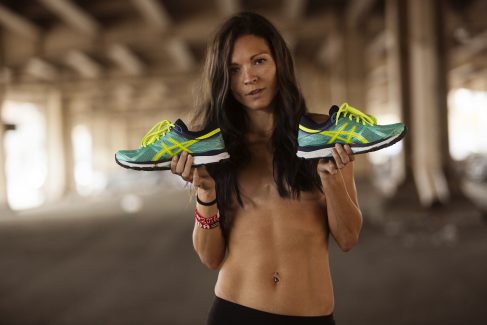Feminist in Front of the Camera: Lanni Marchant Deconstructs Gender
While the skill and talent of elite athletes is appreciated, there’s still a double standard for female athletes at the top of their game. Lanni Marchant writes candidly about the perception of women in sport and how she deals with those who seem to say female athletes can’t be feminine and taken seriously.
I learned something unpleasant when I was asked to speak to the Canadian government about women in sport. My arguments, well received by government officials, were dismissed by some because I didn’t wear enough clothing when I became the fastest Canadian woman to ever run a marathon
Can’t I be feminine, including sexy, and be an advocate? Above I mimicked the cover from the March 2009 iRun, featuring Adam van Koeverden half naked—sorry, shirtless, fondling his runners.
Did van Koeverdan have to think about whether his picture was too sexy? Did he worry that it would undermine his role as a strong athlete, an advocate, or a feminist? I can’t answer that. But I know I have to and that’s BS.
Apparently female bodies are more sexual than males, so my shot isn’t on this issue’s cover. A man showing skin is OK. My picture is not appropriate for the “future is female” edition; the aim of which is to speak out against the double standards women face. I’m not shirtless—I’m half naked.
We chose a different “look” for my cover–powerful, not playful–because being too playful might mean I’m not taken seriously. Being playful may even come across as flirty or sexy and not send the right message. But what is that message? The “future is female” but please be careful not to be too feminine. Be strong, but please do not be too confident. Be a role model, but cover up.
Be you…but not really.
During the cover shoot we paused because—according to the men in the room—the images were becoming too sexual. I was fully clothed. Was kicking my legs out on a chair too lighthearted to depict a powerful woman? Was me standing with my hand on my hip too simple to convey strong? Was me staring at the camera too sexy?
It’s easier to set Canadian records than to take a stupid photograph.
Sex and skin sells (see: March 2009, van Kayak). Does my advocacy no longer mean as much if you think I’m sexy? If I’m sexy, does that make me a sell-out? Does a guy have to think these same thoughts or is his sexiness powerful and masculine?
Male athletes receive unwanted attention for how they look with their shirts off. Are they told to shut up if they complain? Would a male face backlash if he said, See me as an athlete? Or would people agree that—no matter how many magazine shoots he’s done half naked—he’s an athlete and should be appreciated as such?
Women deserve—and I demand—the same latitudes.
When a man is asked to take his shirt off, does he think: Can I be a role model if I’m shirtless?
Are my messages worth less in less clothes?
Does Mr. Kayak’ssexy cover mean he’s no longer a good feminist? Sorry Adam, your intentions might be pure but we have stricter standards. Feminism requires that you wear a shirt.
I deal with these thoughts daily. I’ll receive backlash for writing this. Cowards online will tell me what I’m supposed to do with my body and male friends will man-splain why I’m wrong and how they too share in this experience. They might have received cat calls. Try being a 13-year-old girl knowing it’s going to happen for the rest of your life.
I argued with iRun about the cover, and I lost. But I demand to write this. This conversation is important.
I am an athlete. I am an advocate. I am a woman. I have to be me.

